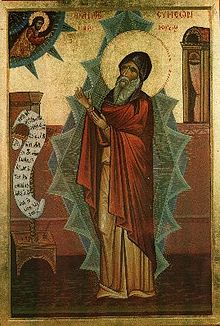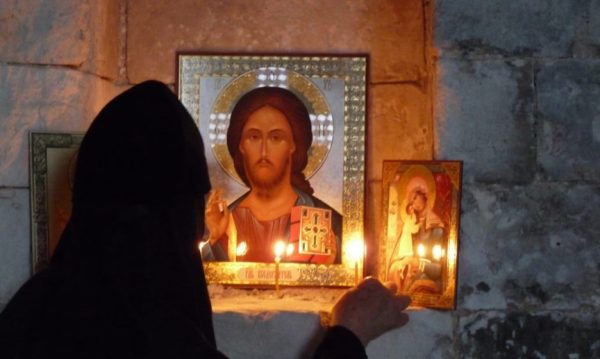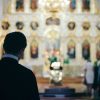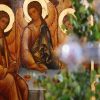The Beatitudes are well known blessings bestowed by Christ on the circle of His disciples and all His followers. The version of the Beatitudes as presented by Matthew (Mat. 5:3-12), rather than that by Luke (Luke 6:20-26), is preeminent because of its poetic and liturgical artistry. In Matthew the Beatitudes enjoy a primacy of honor as the first unit of teaching by Jesus at the beginning of the great Sermon on the Mount (Mat. Chaps. 5-7).
More than precious words of wisdom, the Beatitudes present a moment of revelation of grace. They are blessings actively taking hold and actualized just as they are pronounced by the Messiah Jesus. For those who have eyes to see, they are palpable signs of the presence and power of God’s kingdom, the new world that Christ brings into history. They express the new life of grace and truth as defined by the qualities and traits of discipleship blessed by Christ.
These qualities and traits define the earmarks of the Christian: humility, patient mourning in an unjust world, meekness, longing for God’s justice, mercy, purity of heart, peacemaking, faithfulness when persecuted as Christians. The list is not necessarily a closed list and we can add love, goodness, generosity, self-sacrifice, wisdom, joy and the like. All these traits are bestowed on the disciples by Jesus as both blessings and responsibilities, both gifts and tasks. They make up the content of the charge by Christ to all Christians to be the salt of the earth and the light of the world in Christ’s name (Mat. 5:13-14) in Christ’s name.
When St. Symeon crafted his talk based on the Beatitudes, he intended to lead monastics to the mystery of the risen Christ. In its original publication the discourse was introduced as an exhortation to flee corruptive ways and instead to examine whether all of us as Christians reflect the blessings and qualities of the Beatitudes. Symeon’s own aim is not to provide a detailed exegesis but rather to highlight the blessings of the Beatitudes as criteria of the authentic Christian living. More specifically, as he tells us, his aim was to define the way by which a true disciple of Christ can come to know and be united with the risen and living Christ, through the practice of the Beatitudes. For him the Beatitudes are powerful divine words which, when embraced and lived, lead straight to the mystery of the risen Christ, the source of all life and truth for humanity.
An uncompromising stand, an either/or is demanded by Symeon. Christ’s call to be disciples requires a clear and single-minded decision. Dissociate from all corruptive ways and people that lead in false directions. Commit to the goal against all odds. Practice patience and humility in trials and afflictions. Determine to die rather than to lose the way to salvation. Do not turn back, but press on with zeal by living according to Christ’s teaching. True self-denial requires subtle insight into the affairs of the world, its distractions and temptations, which promise comfort and ease but instead lead us away from God and deliver distress and destruction to the soul. This is true self-denial: not to take the bait that hides the hook, not to be trapped by a snare, not to fall into deceitful ideas and pleasures which promise comfort and delight but actually bring troubles and distress.
The call to radical decision, addressed in the first place to monks, is not primarily about methods. The methods are only the means to the goal. Without full attention to the goal they are useless. Interpreting Symeon we can say that what counts is a person’s intentionality, the depth of one’s desire for God, the touchstone of one’s self-awareness and free will. Is the heart inclined toward Christ and His blessings? Or is it inclined toward the world with its delights and distractions? Does our journey of life follow the broad and easy way of the many? Or the narrow and hard way of the few (Mat, 7:13-14)? Is our devotion directed to love and worship of God? Or is our devotion directed to love of and gain in the world? Every moment is a moment of decision. Every moment is a moment of grace or a moment of darkness. Every moment carries life or death. Jesus said “Where your treasure is, there will your heart be also . . . you cannot serve God and mammon.” (Mat. 5:21, 24)
Monastics for their part have their elaborate ascetical practices. Those of us in the world, as we can say, have our ways of worship and prayer, periods of fasting and feasting, and the duties of honest and fair living, with a spirit of humbleness and cheerfulness. What counts for all is the same principle: to set the heart and mind to Christ. Do not obsess over worldly affairs, Symeon teaches, nor fight with others over material things. But rather practice the Beatitudes as you work to obtain the necessary things of life. The qualitative goal is for Christ to become for us “all things and take the place of all things” (Christos ta panta anti pantôn genêsetai). Those who know the love of God, love no one else more than Christ. This is the goal: to find and see Christ as He is in all His beauty and delight (Christon eurein kai idein).
Traders toil and travel far and wide, even risking their lives, to gain material things and glory. Ought not all of us seek after Christ, the King of kings and Lord of lords (1 Tim. 6:15), to become His “slaves” as He became a “slave” and died for us on the Cross? Many reject the weak and the poor, but God became a lowly human to serve us, to act as father, friend and brother to the lowly and the rejected. The lack of fervor on the part of monks causes pain to Symeon. He urges: Run to Christ whom you have received in Baptism! Repent, be cleansed and renew the seal of the gift of the Holy Spirit given to you! Find the knowledge of the mysteries of Christ not by only words and sounds (en logô monô kai akoê) but by spiritual perception through deed and practice (ergô kai praxei theôroumenês).
 How to do so? Symeon takes up the series of the Beatitudes as stepping stones to build the features of authentic Christian life. Practicing humility is proof that one is not given over to the affairs and pleasures of the world, perishable and troubling as they are. But rather the Christian is able to evaluate worldly things with discernment and even spiritual aversion. As far as mourning is concerned, the true blessing of mourning is not about having or not having material things. Rather it is about our human weakness, our lack of power to practice God’s commandments. It is the awareness of being unworthy to receive God and worship Him properly. A humble awareness of weakness before God creates a paradoxical combination of mourning and joy, a joyful sorrow (charmosynon penthos), which in turn leads to the true comfort of the blessing of meekness.
How to do so? Symeon takes up the series of the Beatitudes as stepping stones to build the features of authentic Christian life. Practicing humility is proof that one is not given over to the affairs and pleasures of the world, perishable and troubling as they are. But rather the Christian is able to evaluate worldly things with discernment and even spiritual aversion. As far as mourning is concerned, the true blessing of mourning is not about having or not having material things. Rather it is about our human weakness, our lack of power to practice God’s commandments. It is the awareness of being unworthy to receive God and worship Him properly. A humble awareness of weakness before God creates a paradoxical combination of mourning and joy, a joyful sorrow (charmosynon penthos), which in turn leads to the true comfort of the blessing of meekness.
And so Symeon builds a kind of chain of virtues that generates a dynamic of personal conversion and renewal by God’s grace. Humility leads to joyful sorrow. Joyful sorrow leads to the comfort of meekness. God then bestows a deeper humility and more enlightenment to the soul. As the soul is purged, there follow more outpourings of the Spirit and knowledge of the treasures and mysteries of God’s kingdom, accompanied by flowing tears and fullness of joy. By all these blessings the soul is uplifted and is able to perceive Christ personally and directly. The soul becomes merciful and meek, peacemaking and incapable of anger, compassionate and purified to see God. The soul comes to perceive the Master and love Him above all things and above every tribulation. The soul comes to love also the neighbor, praying for one’s enemies, seeing their faults as one’s own, even ready to die on their behalf.
The depictions of Christian life centered on Christ, contends Symeon, are a matter of palpable effects, a reality of life transformed into Christlikeness by God’s grace. Come to know, Symeon urges, “the true imprint of the seal of Christ” (tês sphragidos Christou to alêthes ektypôma). The “seal” is the seal of the Holy Spirit, but the “imprint” is that of Christ. “There is truly but one seal, that of the illumination (ellampsis) of the Spirit, although its energies and virtues are many.” He names humility, mourning with an abundance of tears, and meekness, and connects them with all the “fruit” of the Spirit: “peace, kindness, goodness, faithfulness, self-control (Gal. 5:22-23). The presence of all these virtues, the “fruit” of the Spirit, are the tangible tokens of the “imprint” of Christ Himself. The “imprint” may be called the “seal” of Christ too (ektypôma spraghês Christou) because of the mutual indwelling of Christ and Spirit in the unity of God.
The seal of the Holy Spirit stamps the “imprint” of Christ to the soul. The “imprint” itself is the mystical reality which is none other than the personal presence of Christ. Let us ask whether we have the “seal” (sphragis) of the Spirit within us, and thus “know securely whether Christ is within us, [shown] by the afore-mentioned signs” (epignôsômetha ei en hêmin o Christos estin, ek tôn eirêmenôn sêmeiôn). What signs? The blessings of the Beatitudes and all the fruit of the Spirit—all of the evangelical virtues—energized and perfected by the revelations of the Spirit. The Holy Spirit, through the practice of the traits and qualities of the Beatitudes, not only crafts an image of Christ in the soul, but also presents Christ to the soul personally and consciously.
Christlikeness is a biblical teaching. But it is not merely an ethical imitation of Christ, as if the Christian by his or her own ethical efforts and merits could gain Christ. St. Paul says “Be imitators of me, as I am of Christ.” (1 Cor. 11:1) However, the Apostle perceives a mystical bonding of Christ in which, by the Spirit’s action, the Apostle is transformed through participation in the death and resurrection of Christ as saving events (Phil. 3:8-11). In the books attributed to St. John the Evangelist, Christlikeness is depicted as mutual “abiding” of Christ and believers, a mystical sharing of divine life, through faith, love and obedience to Christ (14:21;15:10; 1 John 1:1-4). This is the deeper meaning of St. John’s declaration: “Whoever keeps His [Christ’s] word, in him truly love for God is perfected. By this we may be sure that we are in Him [Christ]: he who says he abides in Him ought to walk in the same way in which He walked.” (1 John 2:5-6)
The rest of the discourse is devoted to exhortations. Do not be deceived by the world and its affairs but pursue Christ, the great light, by increasing within us the divine fire (theion pyr) through the keeping of the commandments. The world is full of temptations, conflicts, confusion, ignorance, darkness! The soul has no light when ruled by evil passions, but suffers a kind of wicked sickness, rendering the person his own enemy and God’s. On the contrary when united to God by faith and action the soul perceives God through contemplation (theôria), a Spirit-filled personal perception of God’s presence. The mind itself becomes light, sees all things as light, and beholds visions of divine light.
 Forsake all transitory things and their effects: strife, envy, deceit, complaining, intrigues, which lead away from God and imperil the soul. Flee the world and take hold of what is eternal. The sun, stars, heaven and earth will pass away! What is the profit of all our endeavors when we die? Either the kingdom or hell, received as rewards from God as we deserve. Therefore, run to the soul-saving Christ (psychosôstês Christos) who is everywhere, hold Him fast, come to know Him consciously (aisthêtôs), so that death has no longer power over us. Symeon ends with a warning not to be deceived by thinking that we do have Christ when we do not, but rather to keep walking the way of God’s commandments, repentance, the cleansing of the heart from all evil. Only then can we hope to have Christ abiding in us through the Holy Spirit who gives life to our souls and a sweet foretaste of the blessings of God’s kingdom.
Forsake all transitory things and their effects: strife, envy, deceit, complaining, intrigues, which lead away from God and imperil the soul. Flee the world and take hold of what is eternal. The sun, stars, heaven and earth will pass away! What is the profit of all our endeavors when we die? Either the kingdom or hell, received as rewards from God as we deserve. Therefore, run to the soul-saving Christ (psychosôstês Christos) who is everywhere, hold Him fast, come to know Him consciously (aisthêtôs), so that death has no longer power over us. Symeon ends with a warning not to be deceived by thinking that we do have Christ when we do not, but rather to keep walking the way of God’s commandments, repentance, the cleansing of the heart from all evil. Only then can we hope to have Christ abiding in us through the Holy Spirit who gives life to our souls and a sweet foretaste of the blessings of God’s kingdom.
A radical message. Flee the world. Save your soul. But most of us cannot and will not leave the world and its affairs. Most of us have wives, children, jobs, duties, a host or responsibilities. Christ’s message is directed to us as we are in the world. Although His kingdom is not “from” this world (ouk estin ek tou kosmou toutou . . . enteuthen, John 18:36), but rather from God’s transcendent reality, yet surely the kingdom is intended to work in this world and for the world, transforming it into a new creation right down here on earth (Rev. 20:1).
Our question: where do we stand? St. John of the Ladder gives us a guiding principle whether we are monastics or whether we are those in the world. “The Christian is one who imitates Christ in thought, word and deed, as far as is possible for human beings, believing rightly and blamelessly in the Holy Trinity” (The Ladder of Divine Ascent, Step 1.4). As far as is possible for human beings, St. John states. And we add, and in the context of our particular backgrounds, talents, opportunities, circumstances and challenges. The critical tipping point lies in our intentionality, our alertness and self-awareness, our prayerful mindfulness, so that we can live a life centered on and inspired by Christ, rather than centered on and inspired by the world.
And here we arrive at the sharp and soul-saving insight of St. Symeon. In moments of joy or sorrow, or of doubt and uncertainty, or of conflict and anger, or of tiredness and listlessness, then at precisely those moments choose the right thing to do in the spirit and teaching of Christ to the extent that you know it! Do not listen and yield to the voice of pursuing gain or power over others, or to the voice of comfort and ease, which stall spiritual progress, as if God’s way is not the way of true comfort and peace! This is the true self-denial, the life-saving ascetical discipline for monks and lay people alike: do not take “the bait that hides the hook,” do not fall into deceitful notions that promise comfort and rest but bring only fleeting reprieve and no lasting peace.
Instead, whether enthused and energetic, or tired and anxious, do the right thing, and continue to do the right thing, as you know it, and in the given circumstances, trusting in God, remembering the way and spirit of Christ, and acting according to His will. You have the promise that Christ is with you always, the assurance that more wisdom and strength will be given to you, and the way will be more clear and secure to the person of the risen Lord Himself. Of course, you will stumble time and again because you are only human. But there is no other option for obtaining true life. Prefer to crawl, even bleed on your knees, if you must, say the saints, but do not give up the way to salvation. There is no other way to find our path to Christ, the incarnate God, who is our true comfort and peace, always trusting in the love and mercy of God.

















